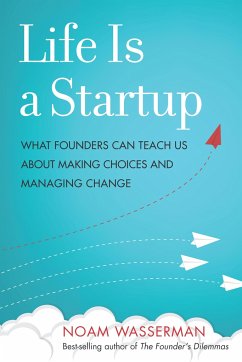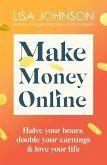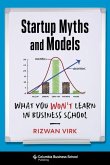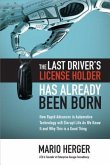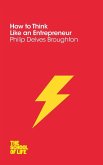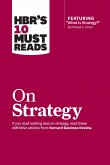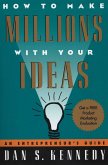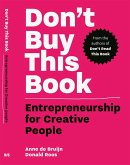- Gebundenes Buch
- Merkliste
- Auf die Merkliste
- Bewerten Bewerten
- Teilen
- Produkt teilen
- Produkterinnerung
- Produkterinnerung
This book shows us how to apply the habits of the most successful startup founders to our everyday lives. Like entrepreneurs, we all deal with uncertainty, toughdecision making, and necessary problem solving. This book offers important advice for those envisioning a change in their lives-from contemplating the next step in a relationship to making a radical career move-and managing changes to which they've already committed. With his database of tens of thousands of entrepreneurship case studies, Noam Wasserman is able to go deeply into the entrepreneurial mindset and show us how startups provide specific lessons for crafting our most successful lives.…mehr
Andere Kunden interessierten sich auch für
![Make Money Online Make Money Online]() Lisa JohnsonMake Money Online13,99 €
Lisa JohnsonMake Money Online13,99 €![Startup Myths and Models Startup Myths and Models]() Rizwan VirkStartup Myths and Models25,99 €
Rizwan VirkStartup Myths and Models25,99 €![The Last Driver's License Holder Has Already Been Born: How Rapid Advances in Automotive Technology Will Disrupt Life as We Know It and Why This Is a Good Thing The Last Driver's License Holder Has Already Been Born: How Rapid Advances in Automotive Technology Will Disrupt Life as We Know It and Why This Is a Good Thing]() Mario HergerThe Last Driver's License Holder Has Already Been Born: How Rapid Advances in Automotive Technology Will Disrupt Life as We Know It and Why This Is a Good Thing37,99 €
Mario HergerThe Last Driver's License Holder Has Already Been Born: How Rapid Advances in Automotive Technology Will Disrupt Life as We Know It and Why This Is a Good Thing37,99 €![How to Think Like an Entrepreneur How to Think Like an Entrepreneur]() Philip Delves BroughtonHow to Think Like an Entrepreneur18,99 €
Philip Delves BroughtonHow to Think Like an Entrepreneur18,99 €![Hbr's 10 Must Reads on Strategy (Including Featured Article What Is Strategy? by Michael E. Porter) Hbr's 10 Must Reads on Strategy (Including Featured Article What Is Strategy? by Michael E. Porter)]() Harvard Business ReviewHbr's 10 Must Reads on Strategy (Including Featured Article What Is Strategy? by Michael E. Porter)16,99 €
Harvard Business ReviewHbr's 10 Must Reads on Strategy (Including Featured Article What Is Strategy? by Michael E. Porter)16,99 €![How to Make Millions with Your Ideas How to Make Millions with Your Ideas]() Dan S. KennedyHow to Make Millions with Your Ideas19,99 €
Dan S. KennedyHow to Make Millions with Your Ideas19,99 €![Don't Buy This Book Don't Buy This Book]() Bruijn, Anne, deDon't Buy This Book18,99 €
Bruijn, Anne, deDon't Buy This Book18,99 €-
-
-
This book shows us how to apply the habits of the most successful startup founders to our everyday lives. Like entrepreneurs, we all deal with uncertainty, toughdecision making, and necessary problem solving. This book offers important advice for those envisioning a change in their lives-from contemplating the next step in a relationship to making a radical career move-and managing changes to which they've already committed. With his database of tens of thousands of entrepreneurship case studies, Noam Wasserman is able to go deeply into the entrepreneurial mindset and show us how startups provide specific lessons for crafting our most successful lives.
Hinweis: Dieser Artikel kann nur an eine deutsche Lieferadresse ausgeliefert werden.
Hinweis: Dieser Artikel kann nur an eine deutsche Lieferadresse ausgeliefert werden.
Produktdetails
- Produktdetails
- Verlag: Stanford University Press
- Seitenzahl: 192
- Erscheinungstermin: 23. Oktober 2018
- Englisch
- Abmessung: 236mm x 156mm x 27mm
- Gewicht: 440g
- ISBN-13: 9781503601758
- ISBN-10: 1503601757
- Artikelnr.: 50910825
- Herstellerkennzeichnung
- Libri GmbH
- Europaallee 1
- 36244 Bad Hersfeld
- 06621 890
- Verlag: Stanford University Press
- Seitenzahl: 192
- Erscheinungstermin: 23. Oktober 2018
- Englisch
- Abmessung: 236mm x 156mm x 27mm
- Gewicht: 440g
- ISBN-13: 9781503601758
- ISBN-10: 1503601757
- Artikelnr.: 50910825
- Herstellerkennzeichnung
- Libri GmbH
- Europaallee 1
- 36244 Bad Hersfeld
- 06621 890
Noam Wasserman holds the Lemann Chair in Entrepreneurship and is Founding Director of the Founder Central initiative at the University of Southern California's Greif Center for Entrepreneurial Studies. He is the author of the best-selling The Founder's Dilemmas: Anticipating and Avoiding the Pitfalls That Can Sink a Startup (2012).
Contents and Abstracts
Introduction: Introduction
chapter abstract
The spark for this book came from a jarring encounter with a student, who
insisted that a course about founders had changed his marriage instead. His
assertion sparked the realization that life is a startup and that we have
to be the founders of our own lives, entrepreneurially making decisions,
building our relationships, and managing our careers in ways that diverge
significantly from conventional approaches.
1The Future Calls; Do You Answer?
chapter abstract
Our desires to make a make change in our lives are often harmed by our
inability to change or our headlong rush into doing so. Some people are
constrained by handcuffs that they progressively create for themselves.
Others get so excited about a change that they become blinded by passion
and rush in too quickly. Neither approach is a recipe for successful
change.
2Your Best Answer: How to Move Forward
chapter abstract
The best practices of founders can show us how to overcome our fear of
leaping while keeping even our most ardent passions in check. We can break
our handcuffs by proactively reducing our personal burn rate, progressively
loosening our psychic handcuffs, escaping the handcuffs of perfection, and
gaining strength through staging. We can keep our passions in check by
focusing on the gray areas where we lack a key ingredient necessary to make
a successful change, examining our missing pillars to road-test our flaws,
by trying before we buy, and by getting outside eyes that aren't looking
through rose-colored glasses.
3Will Failure-and Success-Bring You Down?
chapter abstract
Our ability to make a change faces challenges posed by failure and by
success. Our fear of failure prevents us from making changes, and when
failure occurs, we suffer greatly. On the flip side, we don't appreciate
the potential perils of success-how achieving our dreams can lead to its
own set of problems. These challenges apply to everything from applying for
a promotion to contemplating a relocation to planning a radical career
move.
4Fail and Succeed Productively
chapter abstract
Founders proactively increase the chances that they will be able to fail
well and to anticipate and manage the perils of success. We can do likewise
by harnessing failure to gain strength rather than losing motivation,
finding something to appreciate even during the darkest days, avoiding
overpersisting, and proactively planning an "Undo" key. We can also avoid
perils of success by educating ourselves ahead of time about the potholes
in the road to success, taking control of the "can" and the "want,"
aggressively bolstering our support, and considering refusing the seductive
move "upward."
5Are You Blocked by Your Blueprint and Hooked on Routine?
chapter abstract
Challenges arise after we have envisioned the change we want to make and
move into the "doing" phase. We rely too heavily on our blueprints, or the
well-worn personal mental patterns that we use to make choices. A powerful
part of our blueprints is the inclination for birds of a feather to flock
together, also known as homophily. We are naturally drawn toward
collaborators who are similar to us, often to our peril, by causing
heightened tensions due to overlapping capabilities and gaping holes in our
teams.
6Redraw Your Blueprint and Rethink Your Routines
chapter abstract
Founders think ahead despite, and even because of, the natural temptation
to respond reactively to new developments. They tune in to the potential
disconnects between their existing blueprints and the challenges they are
about to face, and they reduce those disconnects before they get blindsided
by them. They create reminders and checkpoints, demand pushback from
others, and develop blueprint flexibility. Rather than depending on
too-similar collaborators, the best founders relentlessly take stock of
their own weaknesses, recruit people with skills and viewpoints that differ
from their own, and "go ugly early," even if that makes the founders
uncomfortable.
7Are You Playing with Fire and Overemphasizing Equality?
chapter abstract
When making changes, we succumb to two powerful but problematic magnetic
pulls: the tendency to involve family and close friends in our endeavors
and the allure of equality. We are playing with fire when we involve those
who are near and dear to us. The powerful pull of equality sets in when we
strive for fairness and architect egalitarian personal relationships. Few
collaborators-whether cofounders or couples-truly contribute equally, and
pretending otherwise can be counterproductive or even destructive. Although
we take pride in egalitarian arrangements, they tend to increase tensions
rather than increasing stability.
8Fight the Magnetic Pulls of Family and Equality
chapter abstract
When involving family and friends in their endeavors, the best
entrepreneurs diagnose the areas with the highest potential for blowups,
creating "firewalls" and disaster plans to prevent those blowups. They
"date" family and friends even more than the strangers with whom they might
engage, resist the involvement if it's not a good fit, and force difficult
conversations rather than avoiding them. Effective entrepreneurs also know
that an overreliance on building a unified view can prevent progress. They
divide responsibilities and give each person, or "mini-Zeus," sole
authority over a particular area; proactively arrange tiebreakers;
tag-team; and resist the siren song of equality when it comes to splitting
ownership among themselves.
Conclusion: Conclusion
chapter abstract
Most of us face a rich versus king trade-off at one point or another: What
do we give up when we fight to maintain control, whether in a job, a
project, or a relationship? And what do we gain when we yield control? When
does it make sense to give up control to get those gains? In startups, if
founders want to get rich, they can't expect to be the absolute monarch; if
they intend to rule single-handedly, they can't expect the startup to reach
its full potential. In life, we face such trade-offs when we make career
decisions, encounter leadership dilemmas, and marry. The best founders are
able to separate the "my" and "baby" when it comes to decisions affecting
"my baby," keep their eye on the long term even when the short term demands
their attention, and build self-awareness-practices we can adopt, too.
Introduction: Introduction
chapter abstract
The spark for this book came from a jarring encounter with a student, who
insisted that a course about founders had changed his marriage instead. His
assertion sparked the realization that life is a startup and that we have
to be the founders of our own lives, entrepreneurially making decisions,
building our relationships, and managing our careers in ways that diverge
significantly from conventional approaches.
1The Future Calls; Do You Answer?
chapter abstract
Our desires to make a make change in our lives are often harmed by our
inability to change or our headlong rush into doing so. Some people are
constrained by handcuffs that they progressively create for themselves.
Others get so excited about a change that they become blinded by passion
and rush in too quickly. Neither approach is a recipe for successful
change.
2Your Best Answer: How to Move Forward
chapter abstract
The best practices of founders can show us how to overcome our fear of
leaping while keeping even our most ardent passions in check. We can break
our handcuffs by proactively reducing our personal burn rate, progressively
loosening our psychic handcuffs, escaping the handcuffs of perfection, and
gaining strength through staging. We can keep our passions in check by
focusing on the gray areas where we lack a key ingredient necessary to make
a successful change, examining our missing pillars to road-test our flaws,
by trying before we buy, and by getting outside eyes that aren't looking
through rose-colored glasses.
3Will Failure-and Success-Bring You Down?
chapter abstract
Our ability to make a change faces challenges posed by failure and by
success. Our fear of failure prevents us from making changes, and when
failure occurs, we suffer greatly. On the flip side, we don't appreciate
the potential perils of success-how achieving our dreams can lead to its
own set of problems. These challenges apply to everything from applying for
a promotion to contemplating a relocation to planning a radical career
move.
4Fail and Succeed Productively
chapter abstract
Founders proactively increase the chances that they will be able to fail
well and to anticipate and manage the perils of success. We can do likewise
by harnessing failure to gain strength rather than losing motivation,
finding something to appreciate even during the darkest days, avoiding
overpersisting, and proactively planning an "Undo" key. We can also avoid
perils of success by educating ourselves ahead of time about the potholes
in the road to success, taking control of the "can" and the "want,"
aggressively bolstering our support, and considering refusing the seductive
move "upward."
5Are You Blocked by Your Blueprint and Hooked on Routine?
chapter abstract
Challenges arise after we have envisioned the change we want to make and
move into the "doing" phase. We rely too heavily on our blueprints, or the
well-worn personal mental patterns that we use to make choices. A powerful
part of our blueprints is the inclination for birds of a feather to flock
together, also known as homophily. We are naturally drawn toward
collaborators who are similar to us, often to our peril, by causing
heightened tensions due to overlapping capabilities and gaping holes in our
teams.
6Redraw Your Blueprint and Rethink Your Routines
chapter abstract
Founders think ahead despite, and even because of, the natural temptation
to respond reactively to new developments. They tune in to the potential
disconnects between their existing blueprints and the challenges they are
about to face, and they reduce those disconnects before they get blindsided
by them. They create reminders and checkpoints, demand pushback from
others, and develop blueprint flexibility. Rather than depending on
too-similar collaborators, the best founders relentlessly take stock of
their own weaknesses, recruit people with skills and viewpoints that differ
from their own, and "go ugly early," even if that makes the founders
uncomfortable.
7Are You Playing with Fire and Overemphasizing Equality?
chapter abstract
When making changes, we succumb to two powerful but problematic magnetic
pulls: the tendency to involve family and close friends in our endeavors
and the allure of equality. We are playing with fire when we involve those
who are near and dear to us. The powerful pull of equality sets in when we
strive for fairness and architect egalitarian personal relationships. Few
collaborators-whether cofounders or couples-truly contribute equally, and
pretending otherwise can be counterproductive or even destructive. Although
we take pride in egalitarian arrangements, they tend to increase tensions
rather than increasing stability.
8Fight the Magnetic Pulls of Family and Equality
chapter abstract
When involving family and friends in their endeavors, the best
entrepreneurs diagnose the areas with the highest potential for blowups,
creating "firewalls" and disaster plans to prevent those blowups. They
"date" family and friends even more than the strangers with whom they might
engage, resist the involvement if it's not a good fit, and force difficult
conversations rather than avoiding them. Effective entrepreneurs also know
that an overreliance on building a unified view can prevent progress. They
divide responsibilities and give each person, or "mini-Zeus," sole
authority over a particular area; proactively arrange tiebreakers;
tag-team; and resist the siren song of equality when it comes to splitting
ownership among themselves.
Conclusion: Conclusion
chapter abstract
Most of us face a rich versus king trade-off at one point or another: What
do we give up when we fight to maintain control, whether in a job, a
project, or a relationship? And what do we gain when we yield control? When
does it make sense to give up control to get those gains? In startups, if
founders want to get rich, they can't expect to be the absolute monarch; if
they intend to rule single-handedly, they can't expect the startup to reach
its full potential. In life, we face such trade-offs when we make career
decisions, encounter leadership dilemmas, and marry. The best founders are
able to separate the "my" and "baby" when it comes to decisions affecting
"my baby," keep their eye on the long term even when the short term demands
their attention, and build self-awareness-practices we can adopt, too.
Contents and Abstracts
Introduction: Introduction
chapter abstract
The spark for this book came from a jarring encounter with a student, who
insisted that a course about founders had changed his marriage instead. His
assertion sparked the realization that life is a startup and that we have
to be the founders of our own lives, entrepreneurially making decisions,
building our relationships, and managing our careers in ways that diverge
significantly from conventional approaches.
1The Future Calls; Do You Answer?
chapter abstract
Our desires to make a make change in our lives are often harmed by our
inability to change or our headlong rush into doing so. Some people are
constrained by handcuffs that they progressively create for themselves.
Others get so excited about a change that they become blinded by passion
and rush in too quickly. Neither approach is a recipe for successful
change.
2Your Best Answer: How to Move Forward
chapter abstract
The best practices of founders can show us how to overcome our fear of
leaping while keeping even our most ardent passions in check. We can break
our handcuffs by proactively reducing our personal burn rate, progressively
loosening our psychic handcuffs, escaping the handcuffs of perfection, and
gaining strength through staging. We can keep our passions in check by
focusing on the gray areas where we lack a key ingredient necessary to make
a successful change, examining our missing pillars to road-test our flaws,
by trying before we buy, and by getting outside eyes that aren't looking
through rose-colored glasses.
3Will Failure-and Success-Bring You Down?
chapter abstract
Our ability to make a change faces challenges posed by failure and by
success. Our fear of failure prevents us from making changes, and when
failure occurs, we suffer greatly. On the flip side, we don't appreciate
the potential perils of success-how achieving our dreams can lead to its
own set of problems. These challenges apply to everything from applying for
a promotion to contemplating a relocation to planning a radical career
move.
4Fail and Succeed Productively
chapter abstract
Founders proactively increase the chances that they will be able to fail
well and to anticipate and manage the perils of success. We can do likewise
by harnessing failure to gain strength rather than losing motivation,
finding something to appreciate even during the darkest days, avoiding
overpersisting, and proactively planning an "Undo" key. We can also avoid
perils of success by educating ourselves ahead of time about the potholes
in the road to success, taking control of the "can" and the "want,"
aggressively bolstering our support, and considering refusing the seductive
move "upward."
5Are You Blocked by Your Blueprint and Hooked on Routine?
chapter abstract
Challenges arise after we have envisioned the change we want to make and
move into the "doing" phase. We rely too heavily on our blueprints, or the
well-worn personal mental patterns that we use to make choices. A powerful
part of our blueprints is the inclination for birds of a feather to flock
together, also known as homophily. We are naturally drawn toward
collaborators who are similar to us, often to our peril, by causing
heightened tensions due to overlapping capabilities and gaping holes in our
teams.
6Redraw Your Blueprint and Rethink Your Routines
chapter abstract
Founders think ahead despite, and even because of, the natural temptation
to respond reactively to new developments. They tune in to the potential
disconnects between their existing blueprints and the challenges they are
about to face, and they reduce those disconnects before they get blindsided
by them. They create reminders and checkpoints, demand pushback from
others, and develop blueprint flexibility. Rather than depending on
too-similar collaborators, the best founders relentlessly take stock of
their own weaknesses, recruit people with skills and viewpoints that differ
from their own, and "go ugly early," even if that makes the founders
uncomfortable.
7Are You Playing with Fire and Overemphasizing Equality?
chapter abstract
When making changes, we succumb to two powerful but problematic magnetic
pulls: the tendency to involve family and close friends in our endeavors
and the allure of equality. We are playing with fire when we involve those
who are near and dear to us. The powerful pull of equality sets in when we
strive for fairness and architect egalitarian personal relationships. Few
collaborators-whether cofounders or couples-truly contribute equally, and
pretending otherwise can be counterproductive or even destructive. Although
we take pride in egalitarian arrangements, they tend to increase tensions
rather than increasing stability.
8Fight the Magnetic Pulls of Family and Equality
chapter abstract
When involving family and friends in their endeavors, the best
entrepreneurs diagnose the areas with the highest potential for blowups,
creating "firewalls" and disaster plans to prevent those blowups. They
"date" family and friends even more than the strangers with whom they might
engage, resist the involvement if it's not a good fit, and force difficult
conversations rather than avoiding them. Effective entrepreneurs also know
that an overreliance on building a unified view can prevent progress. They
divide responsibilities and give each person, or "mini-Zeus," sole
authority over a particular area; proactively arrange tiebreakers;
tag-team; and resist the siren song of equality when it comes to splitting
ownership among themselves.
Conclusion: Conclusion
chapter abstract
Most of us face a rich versus king trade-off at one point or another: What
do we give up when we fight to maintain control, whether in a job, a
project, or a relationship? And what do we gain when we yield control? When
does it make sense to give up control to get those gains? In startups, if
founders want to get rich, they can't expect to be the absolute monarch; if
they intend to rule single-handedly, they can't expect the startup to reach
its full potential. In life, we face such trade-offs when we make career
decisions, encounter leadership dilemmas, and marry. The best founders are
able to separate the "my" and "baby" when it comes to decisions affecting
"my baby," keep their eye on the long term even when the short term demands
their attention, and build self-awareness-practices we can adopt, too.
Introduction: Introduction
chapter abstract
The spark for this book came from a jarring encounter with a student, who
insisted that a course about founders had changed his marriage instead. His
assertion sparked the realization that life is a startup and that we have
to be the founders of our own lives, entrepreneurially making decisions,
building our relationships, and managing our careers in ways that diverge
significantly from conventional approaches.
1The Future Calls; Do You Answer?
chapter abstract
Our desires to make a make change in our lives are often harmed by our
inability to change or our headlong rush into doing so. Some people are
constrained by handcuffs that they progressively create for themselves.
Others get so excited about a change that they become blinded by passion
and rush in too quickly. Neither approach is a recipe for successful
change.
2Your Best Answer: How to Move Forward
chapter abstract
The best practices of founders can show us how to overcome our fear of
leaping while keeping even our most ardent passions in check. We can break
our handcuffs by proactively reducing our personal burn rate, progressively
loosening our psychic handcuffs, escaping the handcuffs of perfection, and
gaining strength through staging. We can keep our passions in check by
focusing on the gray areas where we lack a key ingredient necessary to make
a successful change, examining our missing pillars to road-test our flaws,
by trying before we buy, and by getting outside eyes that aren't looking
through rose-colored glasses.
3Will Failure-and Success-Bring You Down?
chapter abstract
Our ability to make a change faces challenges posed by failure and by
success. Our fear of failure prevents us from making changes, and when
failure occurs, we suffer greatly. On the flip side, we don't appreciate
the potential perils of success-how achieving our dreams can lead to its
own set of problems. These challenges apply to everything from applying for
a promotion to contemplating a relocation to planning a radical career
move.
4Fail and Succeed Productively
chapter abstract
Founders proactively increase the chances that they will be able to fail
well and to anticipate and manage the perils of success. We can do likewise
by harnessing failure to gain strength rather than losing motivation,
finding something to appreciate even during the darkest days, avoiding
overpersisting, and proactively planning an "Undo" key. We can also avoid
perils of success by educating ourselves ahead of time about the potholes
in the road to success, taking control of the "can" and the "want,"
aggressively bolstering our support, and considering refusing the seductive
move "upward."
5Are You Blocked by Your Blueprint and Hooked on Routine?
chapter abstract
Challenges arise after we have envisioned the change we want to make and
move into the "doing" phase. We rely too heavily on our blueprints, or the
well-worn personal mental patterns that we use to make choices. A powerful
part of our blueprints is the inclination for birds of a feather to flock
together, also known as homophily. We are naturally drawn toward
collaborators who are similar to us, often to our peril, by causing
heightened tensions due to overlapping capabilities and gaping holes in our
teams.
6Redraw Your Blueprint and Rethink Your Routines
chapter abstract
Founders think ahead despite, and even because of, the natural temptation
to respond reactively to new developments. They tune in to the potential
disconnects between their existing blueprints and the challenges they are
about to face, and they reduce those disconnects before they get blindsided
by them. They create reminders and checkpoints, demand pushback from
others, and develop blueprint flexibility. Rather than depending on
too-similar collaborators, the best founders relentlessly take stock of
their own weaknesses, recruit people with skills and viewpoints that differ
from their own, and "go ugly early," even if that makes the founders
uncomfortable.
7Are You Playing with Fire and Overemphasizing Equality?
chapter abstract
When making changes, we succumb to two powerful but problematic magnetic
pulls: the tendency to involve family and close friends in our endeavors
and the allure of equality. We are playing with fire when we involve those
who are near and dear to us. The powerful pull of equality sets in when we
strive for fairness and architect egalitarian personal relationships. Few
collaborators-whether cofounders or couples-truly contribute equally, and
pretending otherwise can be counterproductive or even destructive. Although
we take pride in egalitarian arrangements, they tend to increase tensions
rather than increasing stability.
8Fight the Magnetic Pulls of Family and Equality
chapter abstract
When involving family and friends in their endeavors, the best
entrepreneurs diagnose the areas with the highest potential for blowups,
creating "firewalls" and disaster plans to prevent those blowups. They
"date" family and friends even more than the strangers with whom they might
engage, resist the involvement if it's not a good fit, and force difficult
conversations rather than avoiding them. Effective entrepreneurs also know
that an overreliance on building a unified view can prevent progress. They
divide responsibilities and give each person, or "mini-Zeus," sole
authority over a particular area; proactively arrange tiebreakers;
tag-team; and resist the siren song of equality when it comes to splitting
ownership among themselves.
Conclusion: Conclusion
chapter abstract
Most of us face a rich versus king trade-off at one point or another: What
do we give up when we fight to maintain control, whether in a job, a
project, or a relationship? And what do we gain when we yield control? When
does it make sense to give up control to get those gains? In startups, if
founders want to get rich, they can't expect to be the absolute monarch; if
they intend to rule single-handedly, they can't expect the startup to reach
its full potential. In life, we face such trade-offs when we make career
decisions, encounter leadership dilemmas, and marry. The best founders are
able to separate the "my" and "baby" when it comes to decisions affecting
"my baby," keep their eye on the long term even when the short term demands
their attention, and build self-awareness-practices we can adopt, too.

